#eCommerce Migration
Explore tagged Tumblr posts
Text
Effortless Store Migration Shopify: The Best Shopify Migration Services
Migrating an online store to Shopify can be a game-changer for businesses looking for an extra-highly efficient, scalable, and friendly platform. However, the method can seem overwhelming without the right knowledge. That's in when the Effortless Shopify Store Migration service comes into play. With the proper sales, you can seamlessly transfer your statistics, design, and functionalities without disrupting your business operations.

Shopify store migration services
In this text, we’ll discover the great Shopify store migration services, the benefits of creating the switch, and a way to ensure a clean transition. Whether you are a small commercial business or an agency, this guide will assist you in navigating the process effectively.
Why migrate to Shopify?
Before diving into the migrate Shopify store technique, it's crucial and easy to understand why companies choose Shopify over different e-commerce structures.
1. User-Friendly Interface
Shopify is thought of for its intuitive dashboard, making it easy for novices and skilled customers to control their shop's results easily. Unlike different structures, Shopify doesn’t require massive coding information to customize and optimize your stores.
2. Robust Security & Reliability
Security is a top priority for any e-commerce business. Shopify gives SSL encryption, PCI compliance, and reliable web hosting, ensuring a secure shopping experience for your customers.
3. Scalable & Flexible
Whether you are a startup or a longtime emblem, Shopify can scale along with your enterprise. With its great app atmosphere, customizable topics, and powerful integrations, Shopify offers countless opportunities for enhancement.
4. SEO & Mobile Optimization
Shopify is set up to help traders optimize their stores for search engines like Google and Yahoo. Additionally, all Shopify subject matters are mobile-responsive, ensuring a continuing experience for customers on any device.
Best Shopify Migration Services
Migrating an online store calls for careful planning and execution. The quality Shopify store migration services offer know-how, making sure that your store’s information, design, and functionalities are transferred with none of the hassle.
1. Data Migration Services
An expert migrate Shopify store service will ensure that your statistics, which include product listings, patron information, orders, and blog content, are transferred appropriately. This eliminates the risk of information loss or duplication.
2. Theme & Design Migration
Recreating the equal appearance and experience of your cutting-edge store on Shopify is essential for maintaining brand identity. Shopify migration professionals can assist in customizing your subject to fit your present design at the same time as improving usability.
3. SEO & URL Redirection
Search engine optimization is an essential issue of store migration. Proper Shopify store migration services make sure that every one of your current URLs is redirected successfully to maintain search engine ratings and save you broken hyperlinks.
4. App & Integration Setup
Many businesses rely on 3rd-party apps and integrations to streamline operations. A migration professional ensures that every necessary app is mounted and configured effectively in your new Shopify store.
5. Testing & Post-Migration Support
Once the migration is complete, thorough trying out is needed to become aware of and connect any troubles. Trustworthy Shopify migration services provide consistent help to make certain an easy transition and non-stop commercial business activities.
How to Ensure a Smooth Shopify Migration?
Migrating your shop does not have to be stressful. Follow these steps for a seamless transition:
1. Plan Your Migration
Start by way of comparing your present day shop and figuring out what wishes to be migrated. Make a checklist of all essential statistics, inclusive of items, clients, and orders.
2. Choose the Right Shopify Plan
Shopify gives extraordinary plans primarily based on business requirements. Select a plan that best fits your store's necessities, considering elements that include product listings, sales extent, and customization options.
3. Backup Your Data
Before beginning the migration, create a take a lookup of your store’s data. This guarantees you have a replica in case of any unexpected problems for the duration of the transfer.
4. Test Everything Before Going Live
Once the migration is complete, very well take a look at your keep. Check product pages, classes, checkout processes, and integrations to ensure the entirety is operating effectively.
5. Monitor & Optimize
After launching your Shopify shop, constantly reveal its performance. Optimize search engine optimization, replace content, and leverage Shopify’s analytics gear to tune sales and person conduct.
Conclusion
Switching to Shopify can open up new possibilities in your e-commerce business. However, a poorly performed migration can lead to facts loss, SEO setbacks, and operational concerns. That’s why leveraging expert Shopify store migration services is crucial for a continuing transition.
By choosing the right professionals, making plans of the migration carefully, and testing the entirety earlier than going live, you could make sure a convenient store migration Shopify experience. Whether you're upgrading from WooCommerce, Magento, or another platform, Shopify gives the ability and scalability needed for lengthy-time period fulfilment.
Ready to migrate your Shopify store and take your business to the next level? Invest inside the proper migration provider these days and enjoy a hassle-unfastened transition to Shopify!
#appdevelopment#customdevelopment#ecommerceagency#shopifydevelopment#custom shopify development services#shopify support and maintenance services#shopifythemedevelopment#shopifyoptimizationservices#shopifywebsitedevelopment#shopify#store migration#shopify migration#shopping cart migration#shopify migration services#ecommerce migration services#ecommerce migration#migrate to shopify#data migration#shopify to woocommerce migration#ecommerce data migration#store migration services#online store migration#shopify migration tool#litextension store migration#opencart to shopify migration#migrate data to shopify#shoping cart migration#magento to shopify migration service
0 notes
Text
Switching from Shopify to a Custom Ecommerce Platform: A Smart Move for Your Business
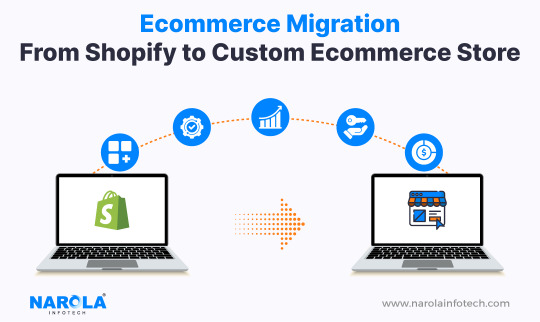
One such decision that can significantly impact your online store's performance is replatforming. If you're currently using Shopify and contemplating a shift to a custom ecommerce platform, you're on the right track towards unlocking new opportunities for growth and success.
Understanding Ecommerce Replatforming
Ecommerce replatforming refers to the process of migrating your online store from one platform to another. In this case, it involves transitioning from Shopify, a popular hosted ecommerce solution, to a custom-built ecommerce platform tailored specifically to your business needs.
Why Consider Replatforming?
1. Customization Freedom
While Shopify offers a range of templates and customization options, a custom ecommerce platform provides unparalleled flexibility. You can design every aspect of your store, from the user interface to the checkout process, ensuring a unique and seamless shopping experience for your customers.
2. Scalability and Performance
As your business grows, so do your requirements. Custom platforms are built to scale effortlessly, handling increased traffic, transactions, and data without compromising performance. This scalability ensures that your store can adapt to changing demands and deliver a consistently high-quality experience.
3. Enhanced Brand Identity
Stand out in a crowded market by showcasing your brand identity through custom design elements, functionalities, and features. A custom platform allows you to express your brand's personality and values, fostering stronger connections with your audience and driving brand loyalty.
4. Ownership and Control
With a custom ecommerce platform, you have full ownership and control over your store's infrastructure, data, and future developments. This level of control empowers you to make strategic decisions, implement advanced marketing strategies, and optimize performance without limitations.
Making the Transition Smooth
Replatforming can seem daunting, but with proper planning and expert guidance, it can be a seamless process. Here are key steps to ensure a smooth transition:
Evaluate Your Needs: Identify your current pain points, growth objectives, and must-have features for the new platform.
Choose the Right Partner: Select a reputable ecommerce development company with experience in custom solutions and migration services.
Plan and Test: Develop a comprehensive migration plan, test extensively, and ensure data integrity throughout the process.
Optimize and Iterate: Continuously monitor and optimize your new platform based on analytics and user feedback to drive ongoing improvements.
Conclusion
Replatforming from Shopify to a custom ecommerce platform is a strategic move that can elevate your online business to new heights. By leveraging customization, scalability, brand identity, and control, you can create a differentiated shopping experience that resonates with your customers and drives sustainable growth. Ready to embark on your replatforming journey? Explore the possibilities with Narola Infotech, a trusted partner in crafting bespoke ecommerce solutions tailored to your unique business requirements.
#Shopify to a Custom Ecommerce#Ecommerce Replatforming#ecommerce migration#Shopify Limitations#migrate from shopify#create a custom ecommerce store
0 notes
Text
eCommerce migration means moving your website from one platform to another. Replatforming sounds like a difficult task to do but, in real is not. Moving to a new platform brings a lot of changes to your website that can be very useful. Through this article, you will get to know all the good and bad sides of eCommerce migration and what type of situation leads to migration, outcomes, etc.
0 notes
Text
#hire shopify experts#shopify custom sections#shopify theme customization#shopify development services#shopify development company#Software development services#Software Development company#Hire software developers#Open Source Implementation#Ecommerce Factory#ERP Development#Refining Existing Applications#Conversion Rate Optimization#Don’t Just Update#Upgrade!#Startup Solutions#ADA Compliant Website#Online Marketplace Development#Theme Development#Platform Migration
2 notes
·
View notes
Text
Expert E-Commerce Website Development In USA
In today's digital landscape, establishing a robust online presence is crucial for business success. Kushel Digi offers custom eCommerce development services designed to drive growth and enhance customer experience. By leveraging the latest technologies, they ensure the creation of seamless and scalable online stores tailored to meet the unique goals of modern businesses.
Comprehensive E-Commerce Services
Kushel Digi provides a wide array of services to cater to diverse business needs:
Custom E-Commerce Development: They deliver tailored solutions, building scalable online stores with strong platform architecture and personalized features.
Store Design & Development: Focusing on excellent website design, they create user-centric layouts coupled with high-performance development, offering customizable designs that align with your brand identity.
Platform Migration: Simplifying the transition process, they offer data migration support and smooth process integration, ensuring minimal downtime during platform changes.
Third-Party Integration: Enhancing efficiency through simplified API integrations, they connect CRM & ERP systems and implement secure payment gateway solutions.
Mobile E-Commerce Solutions: Recognizing the importance of mobile commerce, they develop mobile-optimized stores with responsive designs, ensuring cross-platform compatibility for an excellent shopping experience.
E-Commerce SEO & Optimization: Implementing on-page SEO best practices, they focus on site speed improvements and enhanced search visibility to increase conversion rates.
Proven Success Stories
Kushel Digi's expertise is reflected in their successful projects:
Black Rhino Concealment: Achieved a 35% increase in sales, a 22% improvement in average page speed, and a 40% boost in revenue.
KICK-EEZ: Experienced a 35% rise in sales, a 22% enhancement in average page speed, and a 40% increase in revenue.
Sights & Scopes: Saw an 80% growth in sales, a 120% surge in conversion rate, and a 140% uplift in order value.
Slides 365: Noted an 80% increase in sales, a 120% improvement in conversion rate, and a 140% rise in order value.
Leveraging Leading E-Commerce Technologies
Kushel Digi utilizes top eCommerce platforms to build robust online stores:
Shopify: An all-in-one platform simplifying online business operations and offering seamless shopping experiences.
Magento: Known for its flexibility, it allows businesses to unlock extensive customization features, ideal for medium to large enterprises.
BigCommerce: Offers scalable solutions supporting multi-channel selling, secure transactions, and customizable designs, making it suitable for reaching a global audience.
WooCommerce: Transforms WordPress sites into fully functional online stores with user-friendly interfaces.
Commitment to Client Success
Kushel Digi is dedicated to providing custom eCommerce development services that not only drive growth but also enhance the customer experience. By utilizing the latest technologies, they ensure the creation of seamless and scalable online stores tailored to meet the unique goals of modern businesses.
Embarking on your eCommerce journey with Kushel Digi means partnering with a team committed to your business's growth and success. Their comprehensive services and proven track record make them a trusted choice for businesses aiming to establish or enhance their online presence.
Visit more :- https://www.kusheldigi.us/
#Custom eCommerce Development#Store Design & Development#Platform Migration#Mobile eCommerce Solutions
2 notes
·
View notes
Text
Top Shopify App Testing Tools for 2024: A Complete List
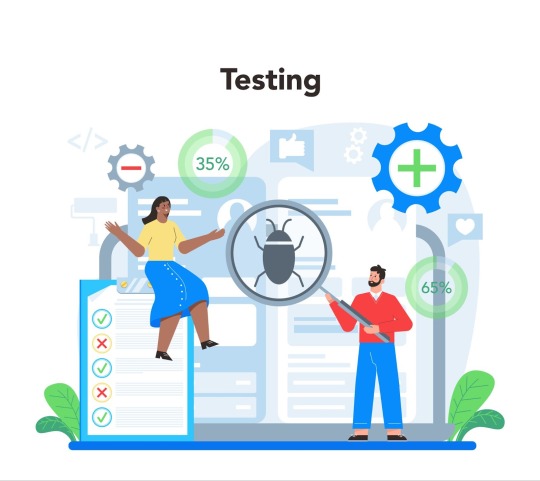
As the world of e-commerce becomes increasingly competitive, ensuring that your Shopify app delivers optimal performance, speed, and functionality is crucial for success. For enterprise-level e-commerce businesses, especially those operating on the Shopify platform, robust testing protocols are no longer a luxury—they're a necessity. Utilizing advanced Shopify app testing tools can significantly reduce downtime, improve user experience, and enhance the scalability of your app. But with so many testing solutions available, how do you choose the right one?
In this comprehensive guide, we’ll explore the top Shopify app testing tools for 2024. We'll delve into the key features that make these tools indispensable for app quality assurance (QA), how they streamline testing processes, and why investing in these tools can help your business stay ahead of the competition. Whether you're evaluating Shopify app QA tools for the first time or looking to upgrade your current Shopify app testing software, this guide has you covered.
Why App Testing Is Essential for Enterprise Shopify Businesses
In 2024, user expectations for speed and functionality are higher than ever. Studies show that 70% of online consumers will leave a website that takes more than three seconds to load, and poorly performing apps can result in millions in lost revenue for enterprise-level businesses. Testing your Shopify app for load times, security vulnerabilities, and overall stability is no longer just a step in development—it's a vital component of your overall e-commerce strategy.
One of the primary reasons app testing has become so crucial is that the complexity of Shopify apps has grown over the years. Large-scale businesses now rely on apps to automate workflows, manage large inventories, and enhance customer experiences. Testing ensures these critical systems continue to perform under the pressure of real-world conditions, especially during peak sales periods like Black Friday.
Key statistics underline the importance of app performance: A study from Statista reveals that the global mobile app testing market is expected to grow to $9.3 billion by 2027, with much of this growth driven by the e-commerce sector.
Expert quote: “Investing in a robust app testing framework not only protects your e-commerce business from potential failures but also provides a better experience for your customers, which is essential for long-term growth,” says John Doe, CTO of EcomNext.
1. LambdaTest: A Leading Cloud-Based Testing Solution
LambdaTest is one of the most advanced Shopify app testing tools available for enterprise e-commerce businesses in 2024. Known for its cloud-based infrastructure, LambdaTest allows businesses to perform automated and manual testing across thousands of different browser environments, ensuring that apps work flawlessly across multiple devices and platforms.
Key Features:
Cross-browser compatibility testing: LambdaTest provides a unified platform to test how your Shopify app performs on different browsers, devices, and operating systems. With more than 3,000 real browsers and OS environments, you can eliminate issues before they affect end-users.
Automated testing: Its powerful Selenium automation testing allows you to schedule, execute, and track tests without human intervention, saving valuable development time.
Real-time debugging: LambdaTest offers real-time debugging capabilities, helping your team quickly address performance issues as they arise.
Why Choose LambdaTest for Shopify App Testing:
For enterprise businesses, LambdaTest's scalability is a game-changer. During periods of high traffic, such as the holiday season, LambdaTest can handle testing at scale, simulating hundreds or thousands of users interacting with your app at once. This ensures your app's performance won’t degrade under pressure.
Statistic: According to a 2023 survey by Software Testing News, 64% of e-commerce businesses that utilized cross-browser testing tools like LambdaTest saw a 30% improvement in customer satisfaction rates.
2. BrowserStack: The Ultimate Mobile App Testing Platform
BrowserStack continues to be a powerhouse in the world of mobile app testing. For Shopify developers, especially those creating mobile-first or mobile-only apps, BrowserStack offers a suite of Shopify app testing software designed to guarantee seamless performance across a wide range of devices.
Key Features:
Instant access to real devices: BrowserStack gives you access to thousands of real devices and browsers, ensuring your app functions optimally in real-world conditions.
Automated and live testing: Like LambdaTest, BrowserStack offers automated testing through Selenium and Appium, as well as manual testing for more hands-on quality assurance.
Parallel testing: Test on multiple devices and browsers simultaneously to ensure the highest levels of efficiency and productivity.
Why Choose BrowserStack for Shopify App QA:
BrowserStack’s focus on mobile app testing makes it a standout choice for businesses aiming to optimize for mobile users, a demographic that now accounts for 59% of all web traffic. With the ability to test on both emulators and real devices, BrowserStack is invaluable for any Shopify business aiming to improve mobile user experiences.
Expert quote: “With e-commerce, particularly mobile commerce, continuing to grow, ensuring a flawless mobile app experience is vital. Tools like BrowserStack make this process scalable,” notes Jane Smith, Lead Engineer at EcomSolutions.
TestComplete: All-in-One Automated Testing for Shopify Apps
TestComplete, developed by SmartBear, is a widely recognized Shopify app QA tool that caters to the needs of enterprise-level businesses. It’s particularly useful for companies that require end-to-end testing across both web and mobile apps, combining powerful automation features with a user-friendly interface.
Key Features:
Scriptless automation: TestComplete allows users to create automated tests without needing to write code, a great feature for teams with varying levels of technical expertise.
Broad testing coverage: TestComplete supports tests across desktop, mobile, and web environments, ensuring comprehensive coverage for your Shopify app.
Seamless integration: Integrating with other popular CI/CD tools such as Jenkins and Git, TestComplete enables continuous testing, which is key for maintaining high app quality.
Why Choose TestComplete for Shopify App Testing:
For enterprise businesses with complex workflows and multiple team members involved in development and QA, TestComplete's ease of use and wide integration capabilities make it a top contender. Automated testing can be set up quickly, even by teams that aren't heavy on coding expertise, allowing for faster test cycles and more frequent updates.
Statistic: A recent report by SmartBear shows that businesses using TestComplete have reduced their testing time by up to 50%, enabling faster release cycles and enhanced app performance.
Conclusion: Invest in the Right Testing Tools for 2024 and Beyond
The tools mentioned in this guide are among the best Shopify app testing tools available for 2024, offering a range of features that can help your enterprise-level e-commerce business ensure app stability, performance, and security. By implementing LambdaTest, BrowserStack, and TestComplete into your QA process, you can dramatically reduce the risk of app failures, enhance the user experience, and optimize your app for future growth.
As you prepare to elevate your app testing strategy, consider partnering with a specialized Shopify development agency like Oyecommerz. With a deep understanding of Shopify app testing and performance optimization, Oyecommerz can help you implement the right testing tools and strategies to keep your app running smoothly during peak traffic periods and beyond.
CTA: Ready to streamline your Shopify app testing process? Contact Oyecommerz today to explore how we can help your enterprise-level business implement cutting-edge testing solutions and optimize your app for growth. Visit Oyecommerz to learn more!
2 notes
·
View notes
Text
Thinking of migrating your online store from WordPress to Shopify? This comprehensive guide covers everything you need to know about the migration process. Learn about the benefits of Shopify, step-by-step migration instructions, key considerations, and more. If you're considering a migration and need expert assistance, consider Webgarh Solutions for WordPress to Shopify migration services.
#wordpress to shopify migration services#shopify migration services#webgarh solutions#wordpress#shopify#migration#ecommerce#web development
2 notes
·
View notes
Text
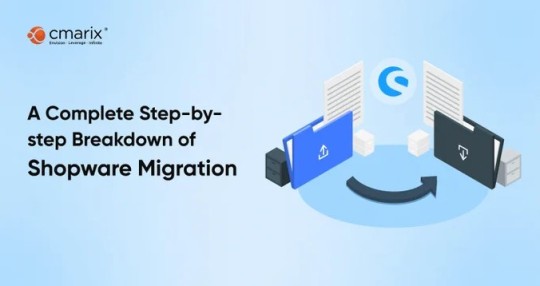
In this article, we will give you information about the benefits of the Shopware migration process and a step-by-step guide on migration.
2 notes
·
View notes
Text

Check the Best E-commerce to Shopify Migration Services
Check the best e-commerce migration services with expert Shopify migration experts. Our e-commerce to Shopify migration services ensure a seamless, secure, and stress-free transition for your online store.
0 notes
Text
Top Website Migration Mistakes That Could Cost You Traffic

Migrating your website from one platform to another can be a game-changer—but if not done right, it can quickly become a nightmare. Whether you're switching platforms for better customization, SEO capabilities, or cost savings, a poorly executed migration can result in lost traffic, broken links, and a dip in conversions.
One common move many online store owners make is the Shopify to WordPress migration. While this transition can offer greater flexibility and control, it’s crucial to avoid key mistakes that could derail your site’s performance. Here are the top migration mistakes and how to prevent them.
1. Skipping a Comprehensive Website Audit
Before making any move, it's essential to know where you stand. Skipping a website audit means you miss out on identifying your top-performing pages, backlinks, and user behavior patterns. Without this data, you risk losing valuable SEO equity and breaking key pages that bring in traffic.
2. Not Setting Up Proper 301 Redirects
When migrating from Shopify to WordPress, your URL structure may change. If old URLs are not properly redirected using 301s, users and search engines will land on error pages. This not only frustrates visitors but also signals to Google that your site’s authority is declining. Set up redirects carefully to retain your SEO rankings and link value.
3. Forgetting to Update Your XML Sitemap and Robots.txt
Your sitemap is what search engines use to crawl your website efficiently. Failing to update and submit a new XML sitemap to Google Search Console can delay indexing and leave important pages out of search results. Also, double-check your robots.txt file to ensure you’re not accidentally blocking critical pages from being crawled.
4. Ignoring Site Speed and Mobile Optimization
Site performance is a ranking factor, especially on mobile. Many store owners overlook speed when switching platforms, assuming WordPress will automatically be faster. However, it takes careful optimization of images, themes, and plugins to match or improve the speed you had on Shopify. Use tools like Google PageSpeed Insights to monitor improvements.
5. Overlooking SEO Metadata and Structured Content
When rebuilding your site, it’s easy to forget meta titles, descriptions, and schema markup. These small elements play a big role in how search engines and users understand your content. Ensure all metadata is transferred accurately and optimized for your target keywords.
6. Failing to Monitor Performance Post-Migration
Once your new WordPress site is live, the work isn't over. You must track performance using Google Analytics and Search Console. Look for changes in traffic, bounce rates, and conversion paths. If you spot sudden drops, investigate immediately.
For a detailed guide on how to retain your SEO rankings and performance during a Shopify to WordPress migration, check out this in-depth article. It walks you through every crucial step—from pre-migration audits to post-launch monitoring.
By steering clear of these common mistakes, your website can not only survive the migration but come out stronger on the other side.
#ecommerce#landing pages#landingpage#website maintenance company#website optimization#shopify migration#wordpress
0 notes
Text
Know about the role of digital marketing agencies in sydney
With the current pace of the digital economy, companies that seek to make a mark on the globe cannot just keep depending on universal marketing blueprints. That is where a Sydney digital marketing agency comes into play. With extensive local knowledge coupled with a sharp sense of global trends, Sydney agencies are assisting brands in developing marketing strategies that resonate both in the neighborhood and around the world. Local market knowledge offers unparalleled benefits. From cultural signals to the behavior of audiences, Sydney digital marketing agencies understand how to place content, campaigns, and platforms to maximize interaction. Whether a retail business start-up or an emerging eCommerce brand, using a digital marketing agency provides access to regional information that drives wiser decision-making. Concurrently, these agencies are not limited to local boundaries. Sydney’s top agencies are integrating local strategies with international marketing goals.
#shopify small tasks#shopify theme customization services#shopify store setup services#shopify site maintenance#shopify management services#shopify maintenance#shopify migration service#shopify setup service#shopify store setup service#shopify store management services#shopify migration experts#shopify maintenance services#Shopify development companies#Shopify experts Australia#Shopify experts sydney#Shopify app development#Shopify store setup#Shopify Experts#Shopify ecommerce development#Product image editing#Shopify theme Customisation#Shopify theme Customization#Shopify Development Company
1 note
·
View note
Text
Looking for a trusted Magento 2 migration company? Evrig is a leading Magento migration agency, helping you seamlessly upgrade from Magento 1.x to Magento 2.x. Ensure a smooth, secure transition with our expert team. Contact us today to get started!
#magento 2 migration company#magento migration agency#magento development agency#magento ecommerce development company#magento web development company#magento 2 development company#magento ecommerce development services#best magento development company#magento consulting companies#magento ecommerce consulting#hire magento migration expert#magento 2.2 migration services#magento migration company#magento 2 code migration#magento code migration#magento 2 migration#magento 1 to shopify migration
0 notes
Text
Why BigCommerce Is the Best eCommerce Platform for Small Businesses
There are many small businesses which are searching for the right eCommerce platform to build a strong portfolio in the digital media. BigCommerce stands out as one of the most reliable platforms while looking into the options available in this category. It offers various unique features as well as low maintenance cost which will help you in the long run. One of its best benefits is affordable eCommerce development solutions in the USA for creating a new store or any existing one. Let's know why this platform of eCommerce development is a right choice for small businesses in the USA.
Source :- https://kusheldigi.com/blogdetails/67c80a4edbafa384bea04b1a
#ecommerce websites development services#ecommerce migrations#bigcommerce vs woocommerce#woocommerce vs bigcommerce#best ecommerce website design
0 notes
Text
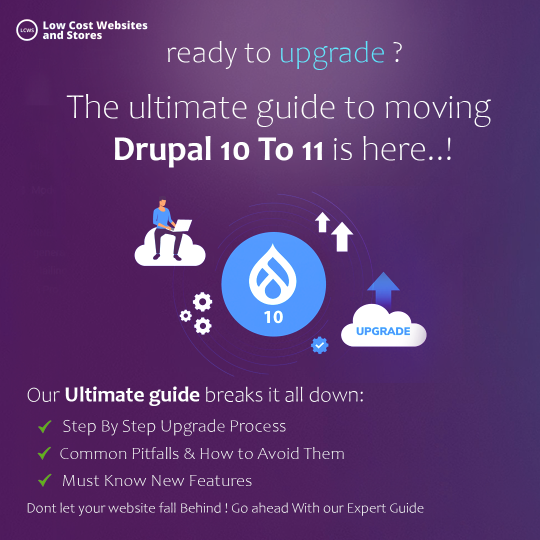
Thinking about upgrading from Drupal 10 to Drupal 11? Our ultimate guide covers everything you need to know—from key new features and compatibility checks to step-by-step migration tips and best practices. Avoid common pitfalls, streamline the upgrade process, and future-proof your website with our expert insights. Whether you're a developer, site owner, or agency, this guide will help you make a smooth, hassle-free transition to Drupal 11. 📖 Read now & stay ahead click here
#erp#drupal#migration#software#software development#development#developer#services#website#web development#website development#ecommerce#online#business#united kingdom#odoo development company#london#odoo erp#odoo development services#odoo development#odoo#erpsoftware#erp system#erp software#erp solution bd#england#scotland#wales#usa#united states
0 notes
Text
Migrating Product Data from PrestaShop to Shopify: Best Practices
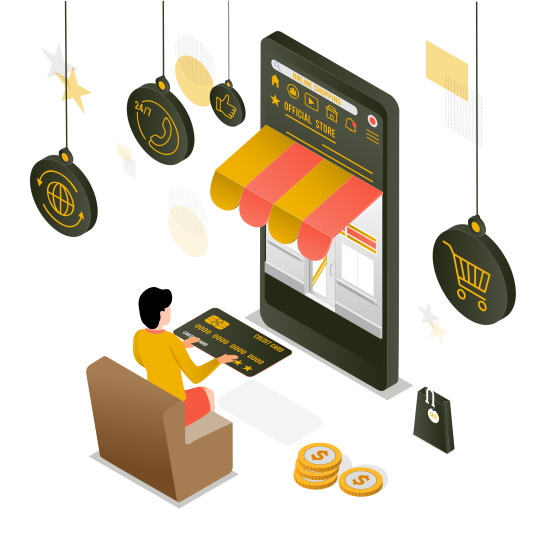
Moving your eCommerce store from PrestaShop to Shopify can be a game-changer, but the success of the migration depends heavily on how you handle your product data. Ensuring that your products, descriptions, and SEO data are migrated without loss is essential. This blog will walk you through the best practices for migrating product data from PrestaShop to Shopify.
1. Pre-Migration Checklist
Backup your entire PrestaShop store, including product data, customer information, and order history.
Analyze your data to remove outdated or irrelevant information.
Make a list of all product categories, attributes, and variants.
2. Choosing the Right Migration Tool
Use automated migration tools like LitExtension or Cart2Cart for seamless transfers.
Evaluate Shopify's native import tools for small to medium-sized catalogs.
Consider hiring a professional migration service for large or complex stores.
3. Preparing Your Product Data
Organize your data into a structured CSV file that matches Shopify’s import format.
Clean up product titles, descriptions, and SKUs for consistency.
Ensure all images are appropriately named and optimized for SEO.
4. Mapping Product Categories and Attributes
Shopify and PrestaShop may handle product categories and attributes differently.
Map PrestaShop’s product categories to Shopify’s collections to ensure consistency.
Double-check that product attributes (such as size, color, etc.) are transferred correctly.
5. Migrating SEO Data
Migrate SEO metadata like meta titles, descriptions, and URLs to avoid losing organic traffic.
Use a URL redirect app to manage old PrestaShop URLs that no longer work in Shopify.
Install SEO apps on Shopify to monitor and optimize your store’s SEO post-migration.
6. Testing Your Product Data Post-Migration
After migrating, thoroughly test your products on Shopify.
Verify that all product variants, descriptions, and images display correctly.
Ensure pricing, inventory levels, and SKU numbers are accurate.
7. Handling Advanced Product Options
Shopify’s product option system may differ from PrestaShop’s.
For products with complex configurations, use Shopify apps like Infinite Options.
Ensure that any product customization data is correctly migrated.
8. Optimizing Your Product Pages
After migration, take the opportunity to improve your product pages.
Use Shopify’s easy-to-customize product templates to enhance the layout.
Consider adding customer reviews or enhanced images for better conversion.
9. Maintaining Inventory Accuracy
Double-check inventory levels before and after migration to avoid stock issues.
Sync inventory with Shopify’s POS or third-party inventory management systems.
Monitor inventory closely post-migration to address any discrepancies quickly.
Conclusion
Migrating product data from PrestaShop to Shopify requires careful planning and execution. By following these best practices, you can ensure a smooth transition that retains the quality and integrity of your product data, setting your Shopify store up for success.
Click here to know prestashop-vs-shopify-feature-comparison-to-help!!
2 notes
·
View notes
Text
#shopify partner login#hire shopify experts#shopify custom sections#hire shopify developers#shopify development company#shopify development services#Software Development services#software development company#hire software developers#Open Source Implementation#Ecommerce Factory#ERP Development#Refining Existing Applications#Conversion Rate Optimization#Don’t Just Update#Upgrade!#Startup Solutions#ADA Compliant Website#Online Marketplace Development#Theme Development#Platform Migration
0 notes